Text
Jin Guangyao and Nie Mingjue
In this post, I want to discuss what I find to be one of the most misunderstood scenes in the entire novel: the altercation between Nie Mingjue and Jin Guangyao near the end of the empathy session during which Nie Mingjue kicks Jin Guangyao down the stairs and threatens to kill him. In particular, it is commonly believed that Nie Mingjue was expecting Jin Guangyao to condemn Xue Yang to death (even though Jin Guangshan was the only one with that power) and that the reason he approached Jin Guangyao in the first place was because he blamed him for Jin Guangshan's failure to condemn Xue Yang to death (even though Jin Guangyao had no way of preventing this). As the argument usually proceeds, Nie Mingjue's threat to kill Jin Guangyao made >!Jin Guangyao's subsequent murder of him!< justifiable self-defense.
Both of these claims are false. When Nie Mingjue confronted Jin Guangyao at the stairs of Jinlintai, he knew perfectly well that the latter did not have the authority to change Xue Yang's verdict. Instead, what he expected Jin Guangyao to do was to kill Xue Yang on his own, and this was something that was very much within Jin Guangyao's power. If Jin Guangyao could get away with >!the murder of the most powerful man in the Jianghu!<, he would certainly be capable of killing a prisoner without being caught—and even if he were, he would have two clan leaders for sworn brothers who would be willing to protect him. What he stood to lose, as he explicitly tells Nie Mingjue, was not his life but his position in the Lanling Jin Clan, and his insistence on prioritizing his ambitions over morality was precisely the problem.
Likewise, Nie Mingjue did not blame Jin Guangyao for the fact that Jin Guangshan had commuted Xue Yang's verdict to life imprisonment. He knew that Jin Guangyao had no say in that decision, though he did blame Jin Guangyao for complying with his father's orders to imprison Xue Yang. However, the main reason that he confronted Jin Guangyao was because he believed him to be complicit in the Chang Clan massacre and Xue Yang's many other atrocities, and because he believed that he should take responsibility for his actions and remove the scourge that he himself had brought into the world—and rightly so.
To understand why this was, we must begin, years prior, with Xue Yang's initial enlistment by the Lanling Jin Clan. As we know, Jin Guangyao was the one who recruited Xue Yang, who recommended him to his father, and who entrusted him with the reconstruction of the Yin Tiger Tally. Nie Mingjue knows this too, and states so explicitly during the staircase incident. All this was entirely Jin Guangyao's initiative, and he cannot blame his father, as he is wont to do. Yes, Jin Guangshan was searching for demonic cultivators at the time, but nothing other than his uncontrollable ambitions forced Jin Guangyao to intentionally recruit a dangerous criminal and hand him a weapon of mass destruction.
And Jin Guangyao was certainly aware, even back then, of who exactly Xue Yang was. In Chapter 30, Lan Wangji describes him as follows: "Ever since the age of fifteen, he had been a delinquent in the area of Kuizhou, known far and wide for his radiant smile, inhumane means, and merciless personality. Everyone's expressions changed whenever he was brought up in a conversation." This description refers to Xue Yang when he lived in Kuizhou, before Jin Guangyao recruited him and he was taken to Lanling. Even more telling is the following exchange from Chapter 49, which occurs immediately after Xue Yang becomes a guest cultivator of the Jin Clan:
Jin Guangyao walked over and spoke with a tone of respect, "Brother."
Nie Mingjue, "Who was that?"
After a moment of hesitation, Jin Guangyao answered carefully, "Xue Yang."
Nie Mingjue frowned, "Xue Yang of Kuizhou?"
Jin Guangyao nodded. Xue Yang had been infamous ever since he was young. Wei Wuxian clearly felt Nie Mingjue's brows knit even tighter. He spoke, "Why are you wasting your time with such a person."
Jin Guangyao, "The Lanling Jin Sect recruited him.
He didn't dare to protest any further. Excuse being that he needed to care for the guests, he scurried to the other side.
Qinghe, where Nie Mingjue resides, is over fifteen hundred kilometers from Kuizhou. The fact that Xue Yang's infamy has spread across China to the point that Nie Mingjue can recognize him by name indicates that he is not a mere petty criminal, but something much worse. While Jin Guangyao may never have heard the saying "When Xue Yang attacks, he leaves behind not even the chicken or the dog," I am confident that this was common currency in Kuizhou. Giving such a man any sort of official position, not to mention providing him with a dangerous weapon, is at best gross negligence and at worst outright murder.
Next, we must consider the atrocities that Xue Yang committed under Jin Guangyao's supervision. As an example, we can take the slaughter of the Tingshan He Clan, which occurs in the "Villainous Friends" extra. As I see it, Jin Guangyao's guilt in the massacre is indisputable (though I am sure that certain Jin Guangyao enthusiasts will disagree); the question is how much Nie Mingjue knew about it. Needless to say, an entire clan could not have disappeared without anyone noticing. Everyone knew that their was a massacre, and they knew that the Lanling Jin Clan had done it. Even if no one saw the Jin cultivators arriving in Tingshan and dragging the members of the He Clan out of their homes, who else would have the motive besides the man whom He Su had just compared to Wen Ruohan?
This is of course why Jin Guangshan goes through the charade of accusing He Su of murdering a Jin Clan member, trying him in a kangaroo court, and convicting his entire clan on trumped-up charges of treason. He knows that there is no way of keeping the massacre a secret, so he instead goes for the next-best option of persuading everyone that it was justified. This is the reason that Nie Mingjue does not confront Jin Guangshan or Jin Guangyao about the massacre of the He Clan: he has no way of proving that the charges were false, even if he suspects this to be the case (and I think he knows the Jins too well to be entirely swayed by their claims).
It is also important to recognize that the massacre of the He Clan was by no means a unique occurrence. MXTX's summary for the "Villainous Friends" extra reads, "The daily lives of the evil duo, committing crimes and wiping evidence." Given that these summaries can be found in the web version of MDZS along with the main text, they can be considered part of the novel canon. While this is not meant to imply that Jin Guangyao and Xue Yang literally massacred another clan every day, it is equally clear that the He Su and his family were not their first victims. Just before He Su arrives, we see Xue Yang experimenting on a sizeable crowd of corpses in his impromptu laboratory, corpses that must have come from somewhere (and, being a practitioner of modao, he would not simply take them from the nearest graveyard as is Wei Wuxian's usual practice).
In any case, we now come to the massacre of the Yueyang Chang Clan. Unlike with the He Clan massacre, we are not privy to the perspectives of Jin Guangyao and Jin Guangshan, so we cannot say for certain that they ordered the massacre. However, we know that this was the first test of the newly reconstructed Yin Tiger Tally, and that the Lanling Jin Clan had never hesitated to slaughter entire clans for Xue Yang's human experiments, so there is good reason to think that the circumstances of the Chang Clan massacre were quite similar to those of the He Clan Massacre. Wei Wuxian's suspicions, as usual, seem to be quite on point
Chapter 30:
Perhaps, Xue Yang destroying the Chang Clan wasn't entirely to avenge what they did to him when he was young. He might have been testing on this clan of live humans what exactly was the extent of the restored Stygian Tiger Seal's powers!
The particular choice of the Chang Clan was of course due to Xue Yang's personal grudge against Chang Ci'an, and one could imagine that Jin Guangyao had granted Xue Yang the privilege of choosing the next clan that would be eliminated as a reward for his success—but, at any rate, none of this excludes the Jin Clan's full approval of and participation in the massacre.
How exactly the Jins were planning to justify the massacre to the other clans is unclear. Possibly, they were hoping to have Xue Yang finish off the entire clan at once and leave no witnesses. They may have intended to come up with yet another false charge to levy against the Chang Clan *post facto*, as they did with the He Clan. Whatever the case, their plans were foiled by Xiao Xingchen, who managed to catch Xue Yang immediately after the massacre and made his crimes public before the Jins could come up with any excuses. At this point, Nie Mingjue finally has solid evidence that Jin Guangyao allowed his subordinate to slaughter an entire innocent clan, and it would hardly be a stretch to conclude that the other clans massacred on Jin Guangyao's orders were no more guilty of the crimes of which they had been accused. It is no surprise, then, that Nie Mingjue immediately storms into Jinlintai to confront Jin Guang … shan.
I cannot count the number of times I have seen the claim that Nie Mingjue should have taken up his grievance with Jin Guangshan rather than Jin Guangyao; as the argument usually proceeds, Nie Mingjue was too afraid to confront a fellow clan leader, so he instead went after the much less powerful Jin Guangyao. If this were really the case, Nie Mingjue would never have dared to confront Jin Guangshan in the first place, nor would he have so strenuously opposed his efforts to establish the position of Xiandu, nor, back before the Sunshot Campaign, would he have been so outspoken against Wen Ruohan's tyranny. Nie Mingjue can be called many things, but he was never a coward, and his decision to confront Jin Guangyao was in no way motivated by fear.
When Nie Mingjue arrives and threatens to execute Xue Yang on the spot, even Jin Guangshan does not dare to protest, having been cowed into silence by Nie Mingjue's rebuke. The only member of the Lanling Jin Clan who attempts to stop Nie Mingjue and save Xue Yang's life is none other than Jin Guangyao. Until this point, I think, Nie Mingjue was willing to ignore Jin Guangyao's role in the massacre and focus on Jin Guangshan (who, after all, was the clan leader), but he could no longer do so when Jin Guangyao went out of his way to obstruct justice and get his subordinate out of trouble.
What is more, unlike before when Jin Guangyao could have excused himself by insisting that he was simply following his father's orders, this claim is not tenable here—there was no way that Jin Guangshan would have expected him to defend Xue Yang when he did not do so himself. The only reason that Jin Guangyao defended Xue Yang was because he knew that finding a demonic cultivator who could reconstruct the Yin Tiger Tally was the surest way of winning his father's favor, and keeping Xue Yang alive would ensure that he stayed in his good graces. Not for the first time and not for the last, Jin Guangyao showed himself willing to sacrifice justice for power, and this was precisely what Nie Mingjue could never tolerate.
While Jin Guangyao did not succeed in persuading Nie Mingjue to relent, the Lanling Jin Clan was nevertheless able to worm their way out of the situation by promising Nie Mingjue that Xue Yang would be executed. It seems, from Nie Mingjue's words during the staircase incident, that Jin Guangyao himself was the one who made this promise \[Chapter 49\]:
Jin Guangyao, "He's already been locked inside the dungeon, imprisoned for life..."
Nie Mingjue, "What did you say to me back then?"
Jin Guangyao was silent. Nie Mingjue continued, "I wanted him to pay blood with blood, yet you have him imprisoned for life?"
Nie Mingjue was presumably given this assurance by someone in the Lanling Jin Clan whom he could reasonably trust, which would obviously not include Jin Guangshan, so it is not such a stretch to think that Jin Guangyao had promised Nie Mingjue that Xue Yang would not be executed. And note that after the Jin Clan goes back on their promise and imprisons Xue Yang after executing him, Jin Guangyao does not even attempt to deny that he intentionally lied; his silence at that juncture, coming from the silver-tongued Lianfang-zun, is quite telling.
Thus, by the time of the staircase incident, Nie Mingjue knew that Jin Guangyao had intentionally recruited a mass murderer, given him a prominent position in the Jin Clan, provided him with a weapon of mass destruction and instructions for how to repair it, sent him on a killing spree with that weapon, and then attempted to protect him when Nie Mingjue demanded justice. Both in universe and out of universe, Nie Mingjue is characterized a man who sees violence as his first option and does not think twice before drawing his saber, but as we see so often in MDZS, this perception is not a true estimation of his character. We see him again and again restraining himself against his better judgement, keeping silent and not voicing his (well-founded) suspicions, and only confronting the Jin Clan when the evidence is so clear that ignoring it would be a crime in itself. If, at this point, he refused to take up the issue with Jin Guangyao because of his personal debts, he would be placing himself firmly on the side of injustice.
I have given my arguments on why I believe that Nie Mingjue was right to confront Jin Guangyao over the Chang Clan massacre; now, I wish to address Nie Mingjue's behavior during the confrontation itself. As usual, Jin Guangyao begins with excuses. He claims that giving Xue Yang a life sentence is tantamount to executing him, as though Nie Mingjue had not yet figured out that Jin Guangshan was planning to let him out of prison as soon as he turned his back. Jin Guangyao denies having known about the massacre in advance and claims to have been "shocked." One might imagine that he was just as shocked at what Xue Yang did to the He Clan.
Finally, Jin Guangyao attempts to push all the blame onto his father. To be sure, Jin Guangshan was guilty of the Chang Clan massacre and of protecting Xue Yang after the fact, and he richly deserved to be kicked down the stairs by Nie Mingjue, but that does not absolve Jin Guangyao of his own role. He chose to work for his father. He chose not to leave the Jin Clan even after he found out what sorts of things were expected of him. He chose to hire Xue Yang. He chose to help Xue Yang slaughter so many innocent clans. He chose to protect Xue Yang after the Chang Clan massacre. Jin Guangyao likes to say, "I had no choice," but he always had choices, and he always chose what would serve his ambitions over what was right.
At this point, we have a very interesting exchange:
Jin Guangyao still wanted to speak, but Nie Mingjue had already lost all patience. "Meng Yao, don't speak such pretentious words in front of me. Your whole thing stopped working on me since a long time ago!"
Within seconds, a few degrees of unease flashed over Jin Guangyao's face, as though someone with an unmentionable illness was suddenly exposed in public. There was nowhere for him to hide.
Why, immediately afterwards, does Jin Guangyao drop the servile, conciliatory façade that he always wears in front of others and adopt a much more aggressive tone towards Nie Mingjue? Lan Xichen believes this to be a consequence of Jin Guangyao's frustration over the watchtowers, but MXTX rather unsubtly tells us the truth: Jin Guangyao is insecure because Nie Mingjue has seen him for exactly what he is: a man who is willing to do anything for the sake of power, a man in whose eyes the lives of others are worthless. He responds to these insecurities by becoming angry and lashing out at Nie Mingjue—but he knows perfectly well that they are the truth, something that many readers still do not.
Jin Guangyao then goes on a long rant about how Nie Mingjue, speaking from his privileged position, could never understand his situation and has no right to criticize him. Of course, it is true that Nie Mingjue is a clan leader with powerful cultivation, neither of which traits Jin Guangyao possesses, but he has never hesitated to help those less fortunate than him (unless they happen to be Wens). I would dare say it is the foundation of his sense of justice. During the Sunshot Campaign, when the Nie forces were already stretched thin, Nie Mingjue further depleted his manpower by assigning some of his cultivators to evacuate civilians from the battlefields. And during those same battles, let us recall who was it who took pity on a young soldier who was being bullied by his comrades, appointed him as his second-in-command, and gave him the best possible recommendation to a fellow clan leader. Even Lan Xichen seems to have treated Jin Guangyao so well only because he was repaying a life debt, but Nie Mingjue helped him purely out of kindness.
And what of Jin Guangyao? Does he, in consideration of his (formerly) lowly position, show kindness to those who are now below him? I think that the answer can be found quite clearly in the "Villainous Friends" extra. Jin Guangyao takes sadistic pleasure in taunting He Su over his fate and the fate of his clan, reveling in the power, or rather the illusion of power, granted to him by his father. Shortly afterwards, he burns down the brothel in which he grew up, and later on >!forces more than twenty prostitutes to rape his father. Does he care that these women are in precisely the same situation that his mother was, and that he is treating them even worse than Jin Guangshan treated Meng Shi? The irony of what Jin Guangyao does to the woman who protected his mother for years is quite intentional on MXTX's part.!<
In any case, what Jin Guangyao wants from Nie Mingjue is not sympathy for his situation, and certainly not help. He wants Nie Mingjue to condone his crimes and allow a mass murderer to go free, and that is something Nie Mingjue would never be willing to do—nor should he be. Even if Jin Guangyao would have to put himself in genuine personal danger to go against his father's wishes, he would still be in the wrong. There are certain crimes that cannot be excused by any extenuating circumstances, and what Jin Guangyao and Xue Yang did was among them. In any case, Jin Guangyao is quite clear about why he felt that he had "no choice":
Do you think that I'm in a steady position, here at the Lanling Jin Sect? Do you think I can rise into power the moment Jin Zixuan dies? Jin Guangshan would rather bring another illegitimate child back than want me to succeed him! You think that I should be afraid of nothing? Well, I'm afraid of everything, even other people!
The meaning is clear: Jin Guangyao is refusing to kill Xue Yang because he wants to succeed his father as the Jin clan leader, and he knows that disobeying him will considerably reduce his chances of doing so. And it is interesting that Jin Guangyao happens to bring up the death of Jin Zixuan, which, as we know (though Nie Mingjue does not) >!was arranged by Jin Guangyao when he lured him to the ambush at Qiongqi Path. It is rather galling of him to justify murder by citing yet another murder that he committed.!<
Jin Guangyao then abruptly switches tack and begins to complain about Nie Mingjue persecuting him over his murder of the Nie cultivators during the Sunshot Campaign. Why exactly is unclear, since this has nothing to do with the situation at hand, though I suspect that he recognized that he was losing the argument and simply began trying to antagonize Nie Mingjue at this point. In any case, he claims to have been justified in killing them, because it was the necessary price of serving as a spy inside the Nightless City, which saved many lives by shortening the war. Nie Mingjue points out the obvious hypocrisy in Jin Guangyao's willingness to sacrifice others' lives for the greater good while refusing to compromise on his own ambitions to do what is right.
Jin Guangyao's response is "Of course we are different!" For the reader, this statement lays bare Jin Guangyao's psychopathic mode of thought and the complete apathy with which he regards the lives of others. For Nie Mingjue, however, it is something more. The incident that their conversation is now referencing was the single worst moment of Nie Mingjue's life. He was beaten, tortured, and humiliated, made to kowtow to the man who killed his father. He was forced to watch as his family and comrades and arms were murdered by a man he once trusted, a man he might even have called a friend. And now, Jin Guangyao is telling him that the reason he killed Nie Mingjue's comrades was not because he "had no choice," but simply because he did not care. Is it any surprise, then, that Nie Mingjue's response is to replicate Jin Guangyao's worst memory, when he was kicked down the stairs of Jinlintai on his father's orders?
Nie Mingjue then draws his saber on Jin Guangyao. Whether he would have actually gone through with his threat and attempted to kill Jin Guangyao is its own question. Personally, I think that he would most likely not have done so, judging from Jin Guangyao's reaction. The two times that Nie Mingjue genuinely tried to kill Jin Guangyao—after Wen Ruohan's assassination, and just before his death—Jin Guangyao was completely terrified and running for his life. His reaction here is rather more low-key:
Jin Guangyao only landed after rolling down more than fifty steps. He didn't even stay on the ground for long before crawling up. With a wave of his hand, he sent away the servants and disciples who surrounded him. Dusting off his robes, he slowly raised his head to look at Nie Mingjue. His eyes were quite calm, almost indifferent. Just as Nie Mingjue unsheathed his saber, Lan Xichen happened to leave the palace to see what was going on, concerned after having waited for long. Seeing the situation before him, he unsheathed Shuoyue as well, "What happened, this time?"
Jin Guangyao, "Nothing. Brother, thank you for your advice."
Clearly, Jin Guangyao does not think he is in any real danger. Even if he were, however—even if Nie Mingjue truly intended to kill him—he would not be wrong to do so. Let us recall that when the San Zun took their oath of sworn brotherhood after the Sunshot Campaign, one component of the oath was that, if any party should "think otherwise," his punishment would be to "face a thousand accusing fingers, be torn from limb to limb." In other words, Jin Guangyao agreed that if he violated the terms of the oath—which presumably excluded abetting mass murder—Nie Mingjue would have the right, or rather the obligation, to execute him.
Unfortunately, Lan Xichen intervenes to remind Nie Mingjue that Jin Guangyao has "constantly been rushing to and fro between Lanling and Qinghe" to play the Cleansing music that helps mitigate the effects of the saber spirit. The irony that the reader can only appreciate later is that, according to Wei Wuxian's explicit statement, >!Jin Guangyao has been playing a corrupted version of the music designed to make Nie Mingjue gradually lose his mind and qi deviate for at least a month prior (see [here](https://www.reddit.com/r/MoDaoZuShi/comments/1fhmt4f/spirit_turmoil_music/) for an elaboration).!<
Nie Mingjue, unfortunately, is unaware of this, and it is for this reason that he relents and eventually makes the fatal mistake of trusting Jin Guangyao one last time.
A few days later, when Jin Guangyao returns to Qinghe to murder Nie Mingjue, he is not doing because his life is in any danger. If that were the case, he would never have dared set foot in the Impure Realm. The reason that he murders Nie Mingjue is because he knows that Nie Mingjue has finally seen through him and will not tolerate any more of his evil deeds. He knows that if he wants to continue to rise in the ranks, and eventually to succeed his father as the leader of the Lanling Jin Clan, he must continue to execute his father's murderous schemes. It is thus that Nie Mingjue becomes yet another victim of Jin Guangyao's ambitions, and it is fitting that he should be the one to rise from the dead and serve justice upon his murderer, and the murderer of so many others.
(Not my Meta. Shamelessly stolen(?) From reddit. I put a link back to the source.)
13 notes
·
View notes
Text

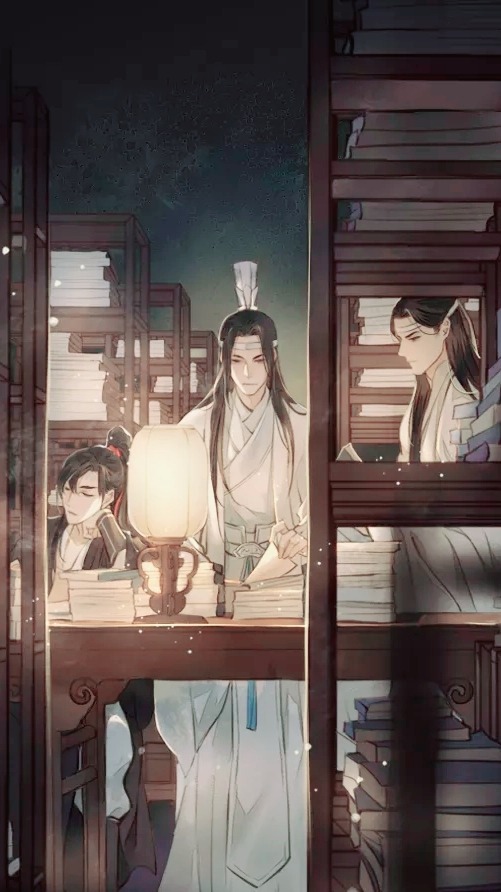
Official art of the Twin Jades of Lan by 毛糰小劍劍 and Qianerbai, respectively
+
Chibi versions by SpoonKid


毛糰小劍劍: https://weibo.com/u/1280427972
Qianerbai: https://twitter.com/qianerbai
SpoonKid: https://twitter.com/spoonbalaba
3K notes
·
View notes
Text
Things that Jiang Cheng would have to accept if he had stopped using Wei Wuxian as a pressure release valve for his emotions and conceded that Wei Wuxian actually had very little to do with his family's conflicts in a pre-Sunshot world.
"My mother is a terrible person who uses me as an excuse to attack my father and sow discord in the family."
My parents are fundamentally incompatible and would be better off and happier apart than together.
The only reason why they are together is because of a system of politics, tradition and social pressure that my mother's clan imposed upon my father.
My sister and I are the products of a system that's making my parents actively miserable.
My family should probably not exist.
Not hard to see why the whipping boy was the coping mechanism.
#jiang cheng#Jiang Cheng holds WWX responsible for his parents' deaths#This is a byproduct of his earliest refusal to place the responsibility where it belongs#He can be mad about Yanli#Everything else connected to the Jiang family was a hellscape of their own creation
2 notes
·
View notes
Text
Rereading MDZS again and it strikes me just how JGY argues that the friendship and assistance he offered to LXC is a debt that LXC owes to him. Does LXC even 'owe' JGY anything even if you look at their relationship from a purely transactional lens? We see no evidence that LXC has failed to support JGY. LXC helps him to expand the hunting grounds at Mt. Baifeng, drinks the tea that Meng Yao prepares to shame the other cultivators for their behaviour, speaks up for him when Jin Zixun throws his wine cup and reiterates, over and over again, that he believes in JGY's innocence in the face of WWX and LWJ's accusations. There is also no evidence that LXC has done anything to oppose Lanling Jin, before and after JGY became the leader of the Sect.
More importantly, LXC also saved JGY's life in return. JGY was counting on LXC's appearance after the assassination of WRH to prevent NMJ from cutting his head off.
In a flash, a figure in a radiantly white robe darted out of the forest. It was like Meng Yao had laid eyes on a god. He immediately scrambled over behind him. “Zewu-jun!! Zewu-jun!!” Nie Mingjue was so overwhelmed with rage that he didn’t even ask why Lan Xichen was suddenly here. He bellowed, “Xichen, get out of the way!” Baxia bore down on them so menacingly that Shuoyue had no choice but to leave its sheath. Lan Xichen moved to meet him, partly to support him and partly to stop him. ... “There’s no need to doubt it,” Lan Xichen said. “The very reason I am here at this moment to assist is because he sent me a message asking me to come. By what other coincidence would I be here?”
-- MDZS Vol. 2, Nie Mingjue's Empathy Flashback
JGY saved LXC's life and allowed him to return to the Cloud Recesses and lead his clan into war against the Wen Clan. LXC defended JGY against NMJ and presented the evidence that allowed JGY to be rehabilitated into society and claim his place as a hero of the Sunshot campaign.
Genuinely tragic for LXC that what he thought was a friendship of mutual support and affection was actually a debt to be used for leverage against him.
He inhaled deeply, then rasped out, “But never have I ever wanted to hurt you!”
-- MDZS Vol. 5, Jin Guangyao at Guanyin Temple
Also kind of interesting that JGY seems to think that the lack of desire to inflict harm is what will exonerate him, especially when the fundamental cause of misery in his life stems from a callous disregard of his needs and desires rather than any deliberate malice.
6 notes
·
View notes
Text




CHIBI WANGXIAN + four seasons 🌸🪷🍂❄️
1K notes
·
View notes
Text

5K notes
·
View notes
Note
hey I hv a question about the novel mdzs. is it stupid that I'm kinda uncomfortable about the phoenix mountain kiss? not only did it feel like non consensual (& probably would have been considered assault if wwx was a female) but um also with regards to the mirroring between wangxian and lwj's parents and that I personally felt that lwj gave a lot of attention to consent because of that (like not touching stranger's etc) & this just seems, not right? sorry I'm prolly killing the vibe of romance
nah you’re good, anon! lots of people feel uncomfortable about the Phoenix Mountain kiss, so you’re definitely not alone. There are extensive discussions out there about the sex scenes in MDZS and consent (here is part four of @three–rings‘s deep dive, which has links to the previous three installments, if you’re interested in reading more), which I am Very Not A Part Of because I pretty solidly ace, and couldn’t make it through those metas (I tried! They’re great! I just… could not do it).
tl;dr, sometimes Your Kink Is Not My Kink and That’s Okay (there are better posts going around out there that I cannot find because I…can barely find things on my own blog much less posts from other people’s). Some people (like wangxian themselves, if fandom informs me correctly) have noncon kinks, which is great for them! Some people don’t have noncon kinks, and don’t like reading that kind of content, which is totally fine! Your preferences are very valid regardless
1K notes
·
View notes
Text
While I’m still in a bad mood, can I be bitter about all the people who want to paint WWX as oblivious for not instantly recognising that LWJ was in love with him?
It’s not as if, textually, WWX doesn’t recognise that LWJ treats him differently than other people? But he just can’t tell whether that is out of friendship (and LWJ’s outstanding character) or something more than friendship:
Although in the past few days, he felt that Lan Wangji probably regarded him highly and differently from other people, he’d never dared to guess just how ‘highly’ it was or if ‘differently’ was the kind that he thought. Wei Wuxian never thought of being confident as bad, and in fact prided himself on such a thought. […] He used to think that Lan Wangji was too easy of a person to understand, but things were different now. He feared that he was the only one who thought of them that way, that it was all his own wishful thinking, that he was too confident for his own good.
And it’s like…. that’s normal!!!!!!! That’s not a sign of bad self-esteem or of being oblivious. Like, gods, have y’all never been in love with one of your friends who treated you differently from everyone else? Took all the ways they showed their regard for you or how they singled you out over others as signs of their interest? Dared to think that they did so because they thought of you that way only to have your hopes brutally crushed because it was just your own wishful thinking all along??? Discovered that they only acted that way out of sincere friendship and that you only got hurt because you allowed yourself to believe it was more than it was???? Especially because that person was someone who was, in the first place, considerate and loyal and kind????????
761 notes
·
View notes
Text
Wei Wuxian and Narrative Agency – Part One
For Xiantober Day One: Genius… albeit stretching the prompt so it refers to MXTX and MDZS itself, but at the end of the day it’s still about WWX – so no harm done!
(Part Two | Part Three | Full version on AO3)
The narrative is a very active player in MDZS’ story. How it presents information, what it chooses to show and omit, often reflects important facets of its themes and characters – Nie Huaisang, for instance, is so good at hiding behind his mask that not even the narrative can hold him accountable; the present day’s storyline as a murder mystery and the slow reveal of information about the past both prompt the reader to think critically about the truth of events, when the importance of thinking critically is an important theme; and the dangers not thinking critically (and instead basing conclusions on rumours without much evidence) are shown by tricking unquestioning readers into the very same trap the cultivation world falls into, as the information given by the title, summary and in-universe rumours – which contradicts how we see actually Wei Wuxian act – turns out to be false.
But nowhere do I love this trait more than in its treatment of Wei Wuxian – and, more specifically, in its way of emphasising his agency. We’re not just told how much his active choices define his character, and we’re not just shown this in-universe through his personality, worldview and the events he causes. I’d argue that this aspect goes a step further, and shapes the structure of the out-of-universe narrative as well.
There are two main ways this happens: one, in how the aspects of Wei Wuxian’s life that are shown and hidden directly tell us what’s important about his character (which is good writing but isn’t necessarily tied to this shaping of the narrative), which is what we’ll explore today; and two, how what’s shown and hidden reflects what Wei Wuxian himself prefers to dwell on, resulting in the narrative respecting his own thoughts and feelings on matters (which very much is tied to it). We’ll explore this at a later date.
But as for now – let’s explore my favourite aspect of MDZS.
(Here, narrative agency will be considered the ability of a character to meaningfully influence their events and the story they’re in.)
Tragedy, Circumstance, Choice
If we simply look at Wei Wuxian’s backstory in a vacuum, it seems almost typically tragic. His parents died in circumstances beyond his control, he was left alone as a child with nobody to care for him, he was forced to grow up fending for himself on the streets, he was faced with abuse when he finally was taken in… as with all typical woobies, everything simply happened to him, and none of it was good. It’s just another example of the lack of agency being used for sympathy points, right?
…Except there’s one problem with that idea. We don’t actually see any of this.
It would’ve been easy to start the flashbacks during these times. We’re telling the story of Wei Wuxian in (largely) chronological order, and these are likely important experiences for him! But instead of starting in his street days, or evenat the moment Jiang Fengmian took him in*, we start at the lectures in the Cloud Recesses. That’s not even something mentioned in, and therefore something that’s able to disprove, the rumours at the start of the novel. So why is this the case?
Well, there are multiple reasons – the main one being that MDZS is also Lan Wangji’s (and Wangxian’s) story, and having the flashbacks open with their first meeting is very satisfying. But I want to focus on something else.
This period doesn’t have to be shown, because what happens to Wei Wuxian, especially out of his control, isn’t what’s important about his character.
We’re not even at Lotus Pier here, where Wei Wuxian certainly has more agency than he would’ve had as a young child, but where the harm caused by Madame Yu is still completely out of his control. Here, he has agency! Though there are consequences, he is free to act, and what happens to him is a result of those actions and not of circumstance. Yes, he gets punished more than others who also take those same actions (due to classism); yes, it’s not his choice to be picked on by Lan Qiren in class (yet look how he responds, twisting the situation to his advantage and ending up tricking Lan Qiren into letting him leave, which is what he wanted to do. He is not at all helpless here!); yes, these choices have been influenced by his learned mindset from Madame Yu that punishment is arbitrary and will happen anyway, so you may as well do what you want regardless. But there is cause-and-effect here. It’s not circumstantial tragedy.
Therefore, instead of our first impression of past!Wei Wuxian being that of an unfortunate woobie, it’s of someone who has the freedom, ability and will to choose and act (and that’s after these initial tragic events have taken place). This is compounded by the fact that before we see any of his backstory, we get a similar impression of him in the present day.
If the purpose of his tragic past was to earn him sympathy points, to make us pity him due to how much he was influenced by events out of his control, this would’ve been a terrible way of going about it… and it’s this that betrays the true reason for its existence. Because now, the flashbacks instead show us how little these tragedies define who he is! From the very start, Wei Wuxian isn’t someone defined by circumstances out of his control, but rather by who he is as a person and by what choices he makes in the present day (which is both a mindset in-universe, and a nice little out-of-universe detail that lines up! Because out-of-universe, this means he’s not defined by sympathy points from a backstory, but rather by his great character writing… aka, by who he is as a person and what choices he makes). And this refusal to be defined by tragedy is a conscious choice on his part, too – but we’ll explore that more later.
The important thing is that this idea of Wei Wuxian isn’t because of what exists in his past, it’s because of what parts of his past are shown to us (as well as what he chooses to do, with agency, in the present).
Now, if this relationship between what’s displayed and what’s omitted was just a one-time thing, I might’ve considered it a cool detail or a nice way to establish a character, but not something the narrative is actively focusing on. But it’s a pattern that continues throughout the flashbacks. What, arguably, are the two other most important times in Wei Wuxian’s life where he doesn’t have enough agency to meaningfully influence his circumstances? His three months in the Burial Mounds (before escaping – he managed to assume some control of the circumstances but not enough to substantially reduce his suffering in his time there), and his loss and death during the First Siege. And we’re not shown either of them! We skip to when Wei Wuxian has emerged from the Burial Mounds and is torturing the Wens, or we skip to the present day – both times he has agency once more, because, again, what he’s like without it doesn’t matter enough to be shown.
Furthermore, I’d argue this does actually contrast the other tragic events we see in Wei Wuxian’s later life. Things do go horribly wrong, but it’s either due to choices he knows the consequences of (see: rescuing the Wen Remnants in the first place), or instances where he still has some ability to act in the situation and influence it within the limitations. If he’d had no ability to influence circumstances at Qiongqi path, he would have died in the ambush; if he’d been unable to do that at Nightless City, he would’ve died then, too (of course Lan Wangji helped him escape as well). The attention drawn to him losing control of his actions in both instances is very interesting, but intentional or not, it’s still his actions influencing the plot. And that influence happens to be detrimental. The very ability to act and influence, at a base level, is not taken away (though, of course, that doesn’t make these events any less tragic).
So, so far, the narrative seems to be telling us that the ability to act and choose is key to Wei Wuxian’s character. And it’s doing it through omitting his moments without agency in favour of instead showing us his moments with it.
Let’s see if this is echoed in the text itself before we go further – because even with this pattern, nothing would end up mattering if Wei Wuxian’s agency wasn’t actually that important to the story itself. But thankfully it is, and that first impression we get of Wei Wuxian in the Cloud Recesses turns out to very much be accurate! Though there are defining circumstances out of his control that occur, such as the massacre of Lotus Pier, the majority of the important events of his life are due to his own choices. He didn’t happen to be forced to cease traditional cultivation and solely use guidao, didn’t happen to lose his Golden Core in a fight with Wen Zhuliu or due to some force in the Burial Mounds, it was his own choice to give it and his spiritual powers away. He didn’t tragically happen to get targeted by the cultivation world, it was a result of him acting on his morals and protecting the Wen remnants (a choice which he was fully aware of the implications of). He isn’t a protagonist to whom things simply occur, and that activeness and agency is my favourite thing about him.
That’s not to say that the times Wei Wuxian doesn’t have agency, or feels like he doesn’t have any, don’t exist at all, either – but they are rare enough to have attention directly drawn to them in his internal narration:
Or else what could he do? He could do nothing. He was powerless. Lotus Pier had been destroyed, both Jiang FengMian and Madam Yu were gone, and Jiang Cheng had disappeared as well. He was the only one left, alone, with not even a sword in his hands. He didn’t know anything, he couldn’t do anything! For the first time, he discovered how little his power was. In front of something as large as the QishanWen Sect, it was the same as a mantis trying to stop a chariot. - Chapter 59, EXR translation
(And even in this circumstance, note that he still does force himself to act – to carry on searching for Jiang Cheng, to place his faith in Wen Ning – and does accomplish his goal (albeit with the help of others)! So even in dire situations, he isn’t simply passive. This is actually also the case with his time in the Burial Mounds, almost certainly the First Siege, and even his days on the streets as well (Chapter 20: he did actively fight with dogs to get food despite their danger and his growing fear of them, rather than just waiting and hoping to somehow receive some more). He can’t influence or immediately influence his circumstances, but that doesn’t stop him from trying.)
Overall, although they do influence him, Wei Wuxian is very much who he is in spite of his circumstances, not because of them. We’re shown the importance of his agency both in-universe by the major impacts his choices have on himself and the plot, as well as by narrative presentation – important periods where he lacks the ability to meaningfully influence anything are often mentioned but not directly shown, which suggests that such moments and circumstances aren’t as important to understanding Wei Wuxian’s character as moments where he does have this agency are. And I’d argue this works very well. Depending on the version of the story you consume, you may end up having different interpretations as to how much circumstances were at play nearer the end of his life – but nobody comes out of MDZS thinking about Wei Wuxian, the poor bearer of yet another generically tragic backstory.
(Part Two | Part Three | Full version on AO3)
—
*We are shown this moment in more detail in Chapter 23… but even then, it’s through the framing of Wei Wuxian remembering Jiang Yanli’s narration, not through a flashback proper or even him remembering the experience itself!
113 notes
·
View notes
Text
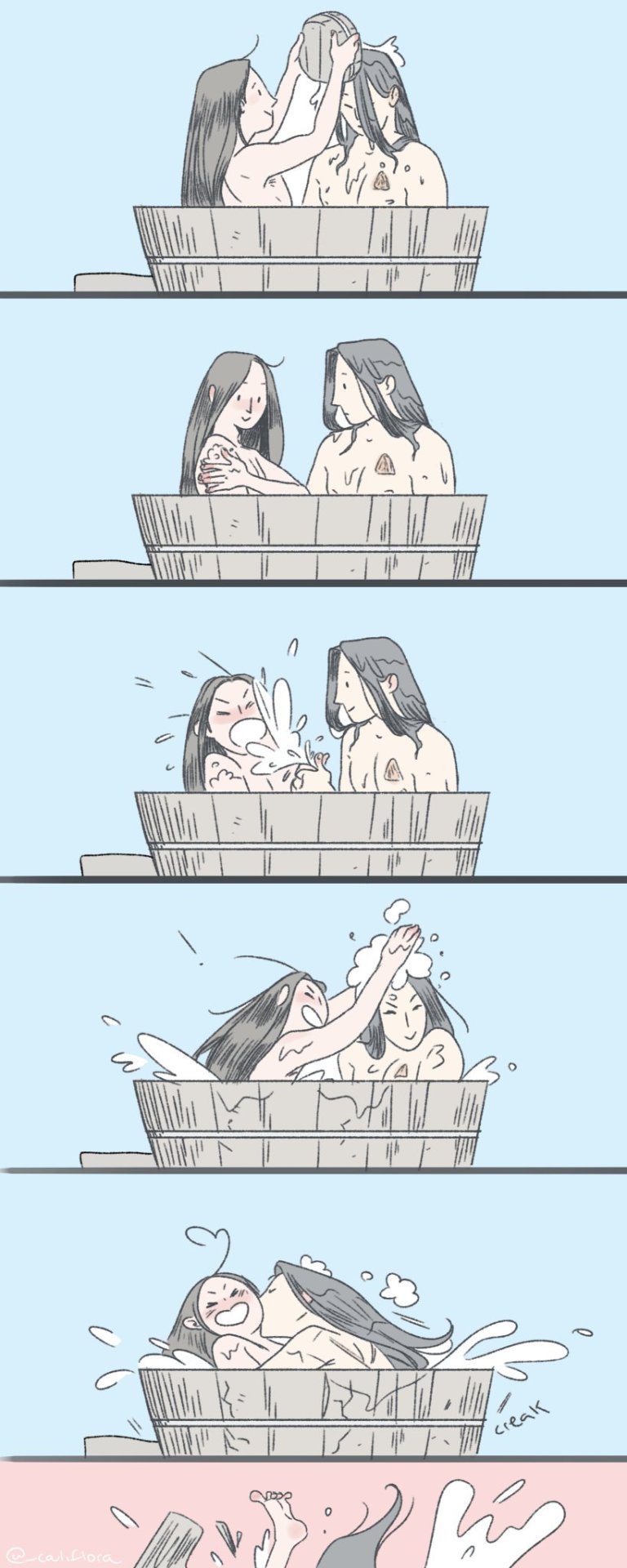
Domestic bliss 🌸
#fanart#lan wangji#wei wuxian#wangxian#Ohhh they are so cute together#let wangxian destroy bathtubs together for the rest of their lives
8K notes
·
View notes
Text
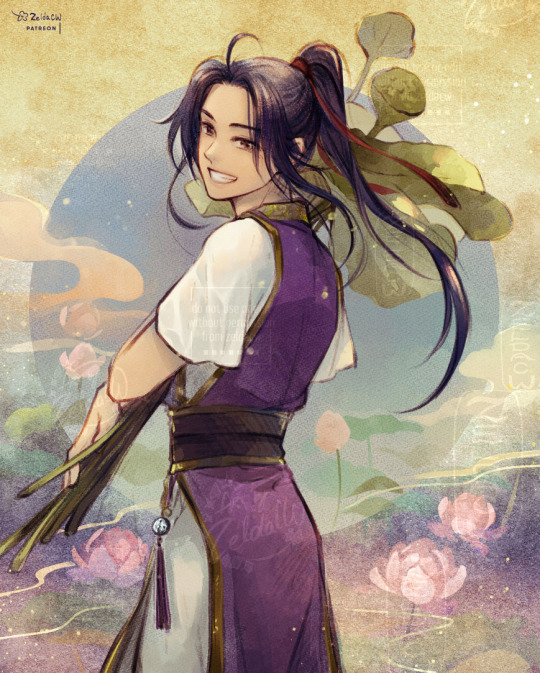
ಥ_ಥ
4K notes
·
View notes
Text
Genuinely surprised to find out that some people in the MDZS fandom believe that Jin Guangyao was not responsible for the death of his son. That's an idea that fundamentally goes against who he is as a character.
Nie Mingjue retorted, “Then why don’t you sacrifice yourself? Are you more distinguished than them? Are you different from them?” Jin Guangyao looked steadily at him. Then, as if he’d finally made up his mind—and in the same moment, given up on something—he calmly replied, “Yes.”
-- MDZS Vol. 2, Confrontation with Nie Mingjue on the stairs of the Jinlintai
Jin Guangyao is led to believe that he must prioritise his own interests and survival, because no one else will do it for him, at least, not on a reliable basis. At no point in the story does he accept his role as a scapegoat for the actions of others, nor does he believe that he is to blame for taking actions that will benefit him in accordance with the corruption of cultivation society. The recurrence of the phrase 'I had no choice' is a mantra that JGY uses to exonerate himself, again and again from the blame that is both rightfully and sometimes unfairly placed on him (such as the issue of his incestuous marriage with Qin Su).
“You’re anxious to find a villain culpable for what happened to Wei-gongzi in his former life, a fiend whom you can saddle with the blame. Then you’ll lash out against him to avenge Wei-gongzi—and to relieve yourself a little of the burden. Perhaps you think that blaming me for everything from the Thousand Sores and Hundred Holes curse to the Qiongqi Path Ambush can alleviate your troubles. By all means, go ahead. It doesn’t matter if you think that way. But you have to understand that you are also responsible for what happened to Wei-gongzi. In fact, you played a large role.
-- MDZS Vol. 5, Guanyin Temple Confession
Here we can see that even after all his crimes have been revealed, Jin Guangyao snaps back when Jiang Cheng attempts to put the blame for Su She's curse on Jin Zixuan. Why would he let himself bear the blame for his son's death if he truly had no hand in his death?
"But you have to know—even if no one murdered A-Song, he still had to die. His only path was death. If we allowed him to grow up, you and I…”
-- MDZS Vol. 2, Confrontation with Qin Su
A world in which Jin Guangyao was not complicit in the murder of his son would not have been a world in which Jin Rusong had to die. No one else but Madame Qin (and Bicao, but he doesn't know about here) knew about his son's incestuous origins, and Madame Qin appears to have had little inclination to reveal the truth of the circumstances surrounding JGY and Qin Su's marriage.
His son's death, in a world where JGY believed that Rusong had better options, would have been a great injustice perpetuated against JGY himself, so why would he accept the blame for it if he believed that he was not ultimately responsible? Even if he simply neglected to take the appropriate precautions in order to 'let it happen', a deliberate act of neglect still makes him responsible, because what is a child supposed to do other than rely on his parents to keep him safe?
#mdzs#jin guangyao#jin rusong#mdzs meta#has it ever been confirmed that his name would have been rusong?
16 notes
·
View notes
Text
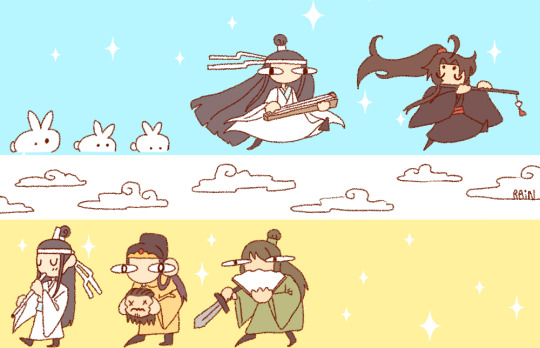
The flutists of Hamelin
309 notes
·
View notes
Text
[mdzs] In depth analysis of Lan Xichen’s name
It’s been 2.5 years since my last MDZS name analysis(!!), and since then I’ve gotten so many requests from the fandom wanting to see more. So here’s to everyone who have enjoyed reading my posts so far - today I’ll be diving into Lan Xichen’s name. Sit back as this is an interesting one!

Lan Xichen is his zi ,or courtesy name, which means ‘chancellor of the morning sunlight’ (Xi 曦 - morning sunlight; Chen 臣- chancellor, minister).
It derives from the poem ‘Xian Qing Fu’ 《闲情赋》 (Ode to a Quiet Life) by Eastern Jin dynasty recluse poet Tao Yuan Ming 陶渊明. Tao is remembered for his appreciation of beauty and serenity of the natural world around him, often admiring the good of others and documenting his wishes for a peaceful and fair society. (NB: The majority of Chinese people would know of the phrase ‘世外桃源’ - Xanadu / fantastical place of great idyllic magnificence and beauty, which originated from him.) This particular poem is a long study on the beauty and virtues of an idealised woman, and is known today as one of the most iconic bodies of work celebrating a woman’s true inner qualities. “悲晨曦之易夕,感人生之长勤” (bēi chén xī zhī yì xī, gǎn rén shēng zhī cháng qín), translates figuratively to ‘it is regrettable that the light of this morning will soon be replaced by the dark night, reminding people that life is filled with endless fatigue.’
One can’t help but draw parallels to Xichen’s life - he was always a noble figure, approached people with sincerity, treated everyone with an equal level of respect and believed deeply in those he stayed close to. But life could not always pay back what he gave to others, as he learnt of his trusted friend Jin Guangyao’s corrupt ways and betrayal - the light that was replaced by darkness.
I find it fascinating how poet Tao’s perspective of the world is so similar to Xichen’s. Tao is known for spending much of his life in reclusion, living in the countryside, receiving only a few guests he had a strong bond with, reading and indulging in his love for poetry. As a talented and knowledgeable man, he spent a decade of his life as a politician - but soon lost faith in a system that was characterised by nepotism, violence, corruption and civil disorder. Torn between ambition and the desire to retreat into solitude, he chose the latter. I wonder if MXTX drew inspiration from this, as Xichen also began as a leader in the cultivators’ world, is a huge lover and collector of literature, and after all the turmoil also decided to withdraw into reclusion.
Xichen’s birth name is 涣 (Huàn), which has two main meanings: 1) ‘melting of snow’; 2) ‘water dispersing in all directions’. His title is 泽芜君 (zé wú jūn), which literally means ‘nourisher of barren lands’ (泽润 - to nourish, bestow; 平芜 - land overgrown with weeds). Combining the two, we can understand his name to mean ‘water disperses in all directions, nourishing everything it touches’. 泽 in Chinese is used specifically to describe bestowing something deep, long-lasting and meaningful (as supposed a one time gift/favour - which would be 惠). In the book, MXTX also describes him as “清煦温雅,款款温柔” (meaning ‘warm, gracious and elegant, gentle in all aspects’). Clearly, his name highlights the grace and kindness he radiates and bestows on everyone around him. He is the keeper of peace and righteousness.
Bonus:
Note that the word Huan 涣 has a water particle, similar to his brother Lan Wangji’s birth name Zhan 湛 - it brings to mind the ‘Twin Jades of Lan’ title for the brothers, with a water element - like Pisces.
Interestingly, in ‘I Ching’ or ‘Book of Changes’, the ancient Chinese divination text which contains of 64 hexagrams, there is a 涣 hexagram:

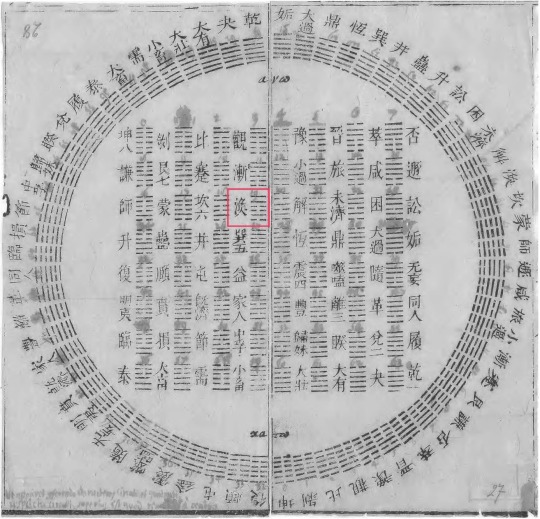
Again, it represents how gentleness can summon greatness. I copy the below from iching-online.com:

In simple terms, it symbolises water that washes away dirt and baptises new life within oneself. And the aftermath is precisely Zhan 湛 in his brother’s name, meaning crystal clear water.
Other name analyses:
Wei Wuxian
Lan Wangji
Jiang Wanyin
Lan Sizhui
570 notes
·
View notes
Text


There’s an interesting story behind Lan Wangji’s name. It comes from the last line of a poem by acclaimed Chinese poet Li Bai. The sentence reads “我醉君复乐 陶然共忘机” (wǒ zuì jūn fù lè, táo rán gòng wàng jī), which translates to “I become drunk and you’re merry; in our happiness we forget about all worldly matters”. In my mind, this scene perfectly brings to life Xianxian enjoying a jar of Emperor’s Smile with Wangji in the Cloud Recesses after his resurrection, when he is no longer concerned with the vanities of the world.
“Wangji” is a Taoist phrase which means “to hold oneself aloof from the world”. The direct translation is “to forget about worldly crafts”. Chinese fans often describe him as “一尘不染” (meaning not be soiled with even a particle of dust) and “不食人间烟火” (a Taoist phrase now used to describe a person who has otherworldly qualities, who does not associate himself with ordinary temporal matters).
Bonus edit:
Wangji’s birth name 湛 (zhàn) derives from the 诗经 (Classic of Poetry), one of the Chinese ‘Five Classics’ dating back to the Zhou Dynasty and a core pillar of Confucian thinking, studied by scholars to this day. The common meanings of this word are “deep” or “crystal clear”. The phrase 湛清 (zhànqīng) is often used to describe a transparent personality or state of mind that is at its purest form, with no distractions or obscurities. The name is really perfect for Wangji, as the phrase 湛深 (zhànshēn) can be used to describe a person displaying profound knowledge and/or mastery of skills in a complex field. 精湛 (jingzhàn) also means to be deeply proficient and skilled at something, normally used to address masters and pioneers. Interestingly, 湛 has another pronunciation, ‘dān’, which means “happiness” or “indulgence”. A third, rarer way of pronouncing the word is ‘chén’, which means “to sink” or “to make extinct”. I think the multifaceted nature of this character perfectly embodies the deep and complicated being that resides within Wangji. I can’t choose a better name for him.
Bonus trivia:
Wangji’s title is 含光君 (hánguāng-jūn), which directly translates to “noble bearer of light”. 含光 is also the name of one of three of the most powerful swords in Chinese history/mythology, said to have been under the care of Shang Dynasty emperors. Its blade is described to be invisible, and a mortal cannot see it being wielded with their bare eyes. Later interpretations during the Warring States period described the three swords as symbolic stages of a person’s journey to finding the Taoist path, with Han Guang being the final stage of ‘preparedness to enter the Way’ (入道合体之状).
WWX’s name story here
JC’s name story here
LSZ’s name story here
LXC’s name story here
2K notes
·
View notes
Text
<A Reader's Maze>
*CW: blood, grief
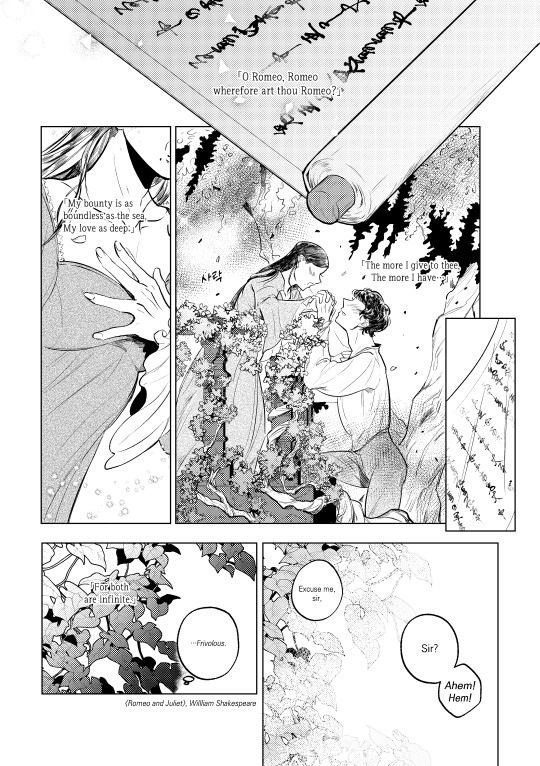

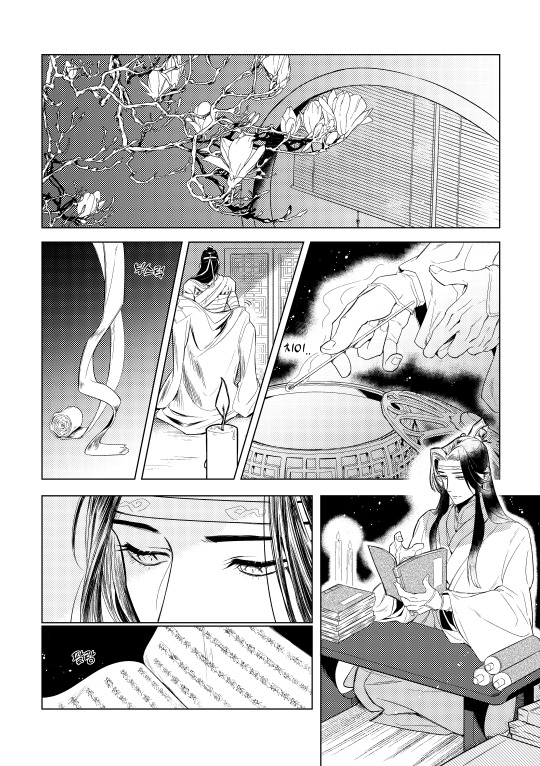


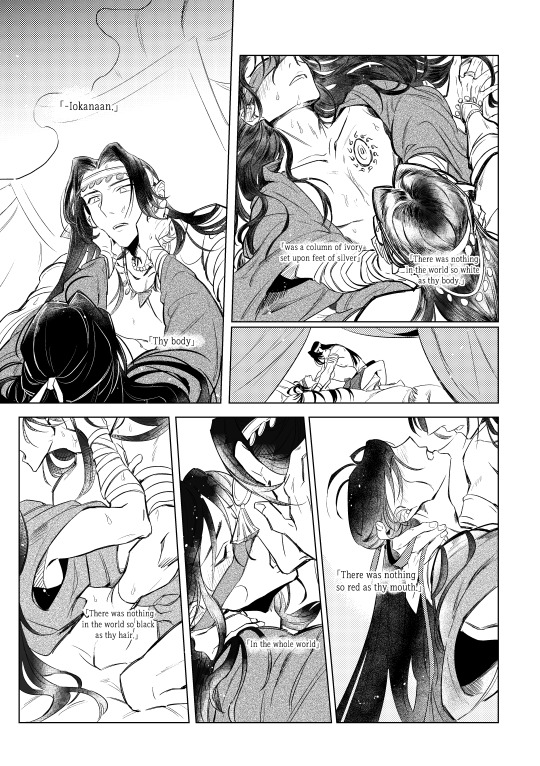
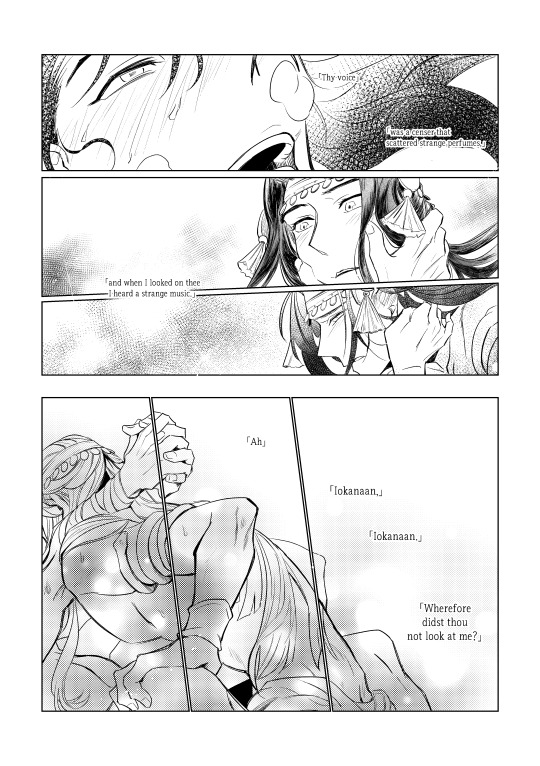

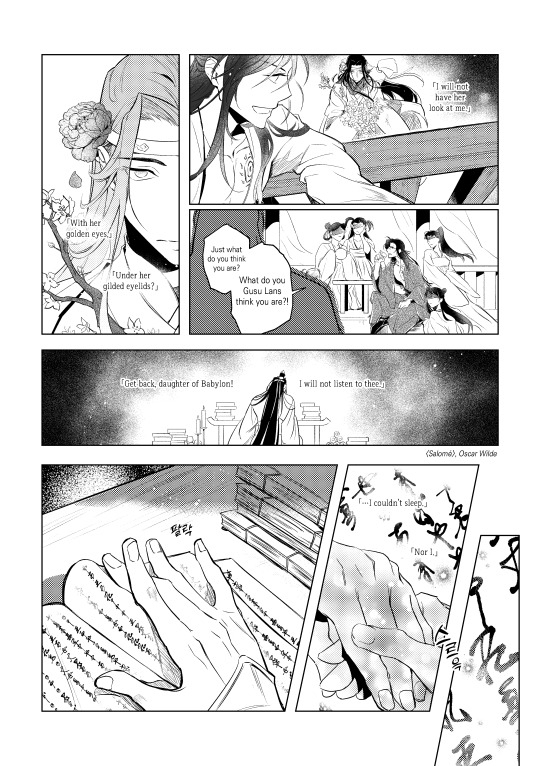
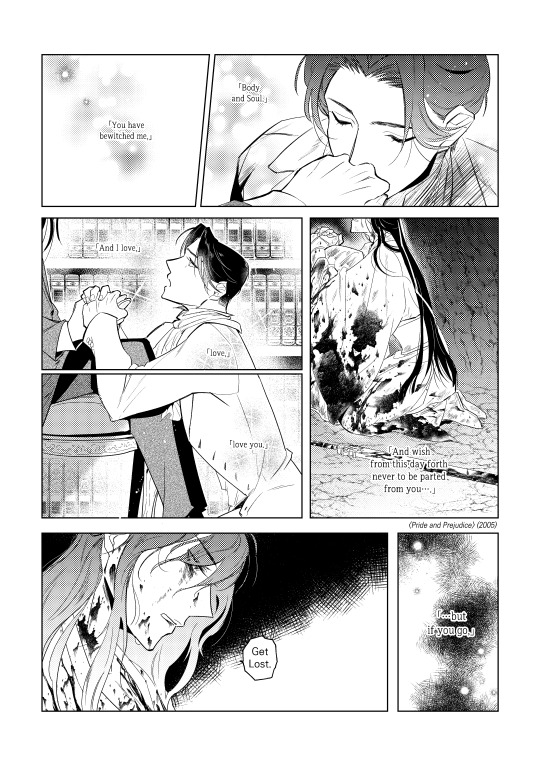
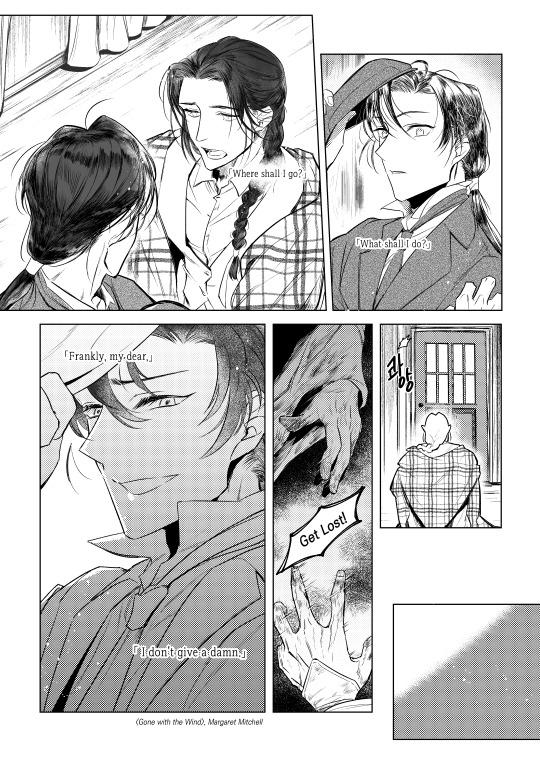



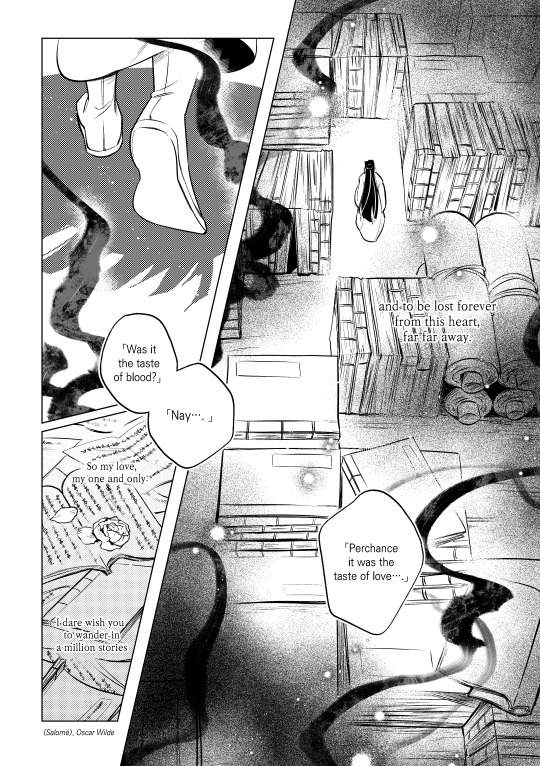
1K notes
·
View notes
Text
some thoughts about qingheng-jun, madam lan, and lan wangji's feelings regarding debt & gratitude
(rest of the thread under the cut <3)
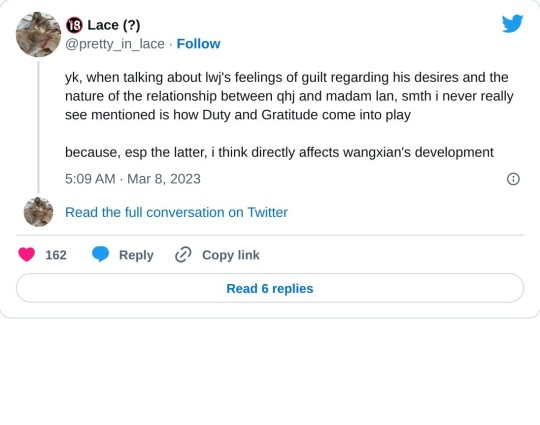
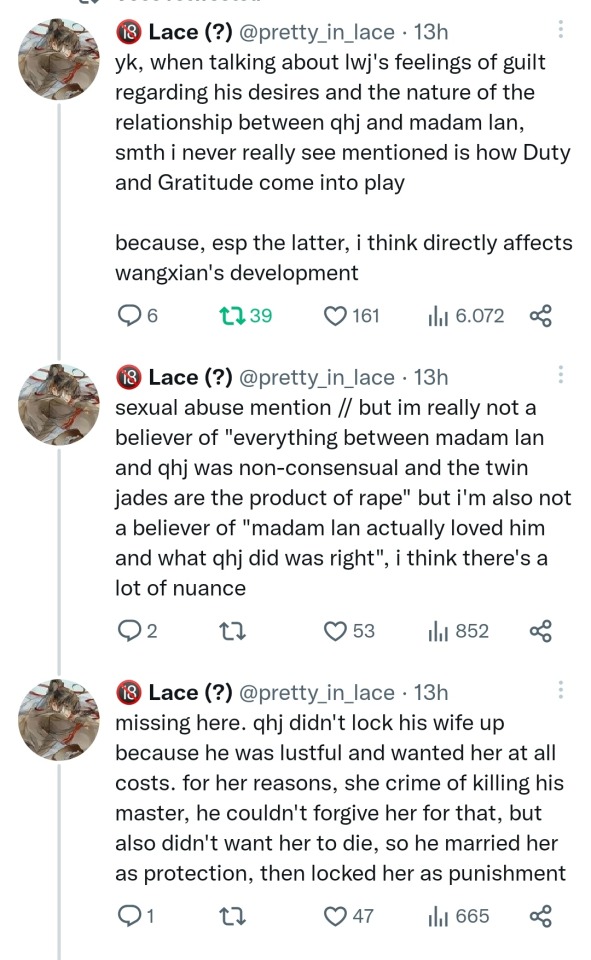
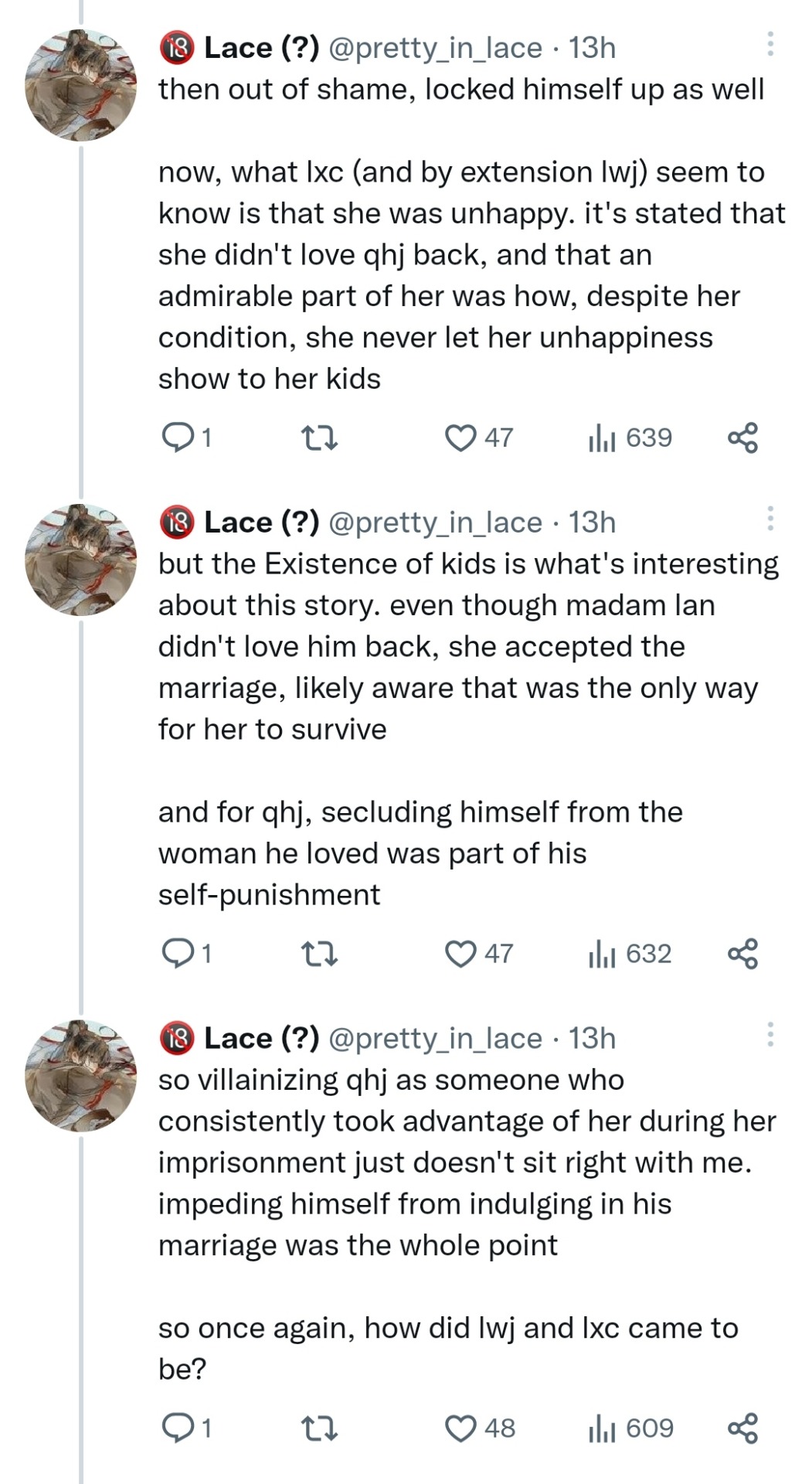
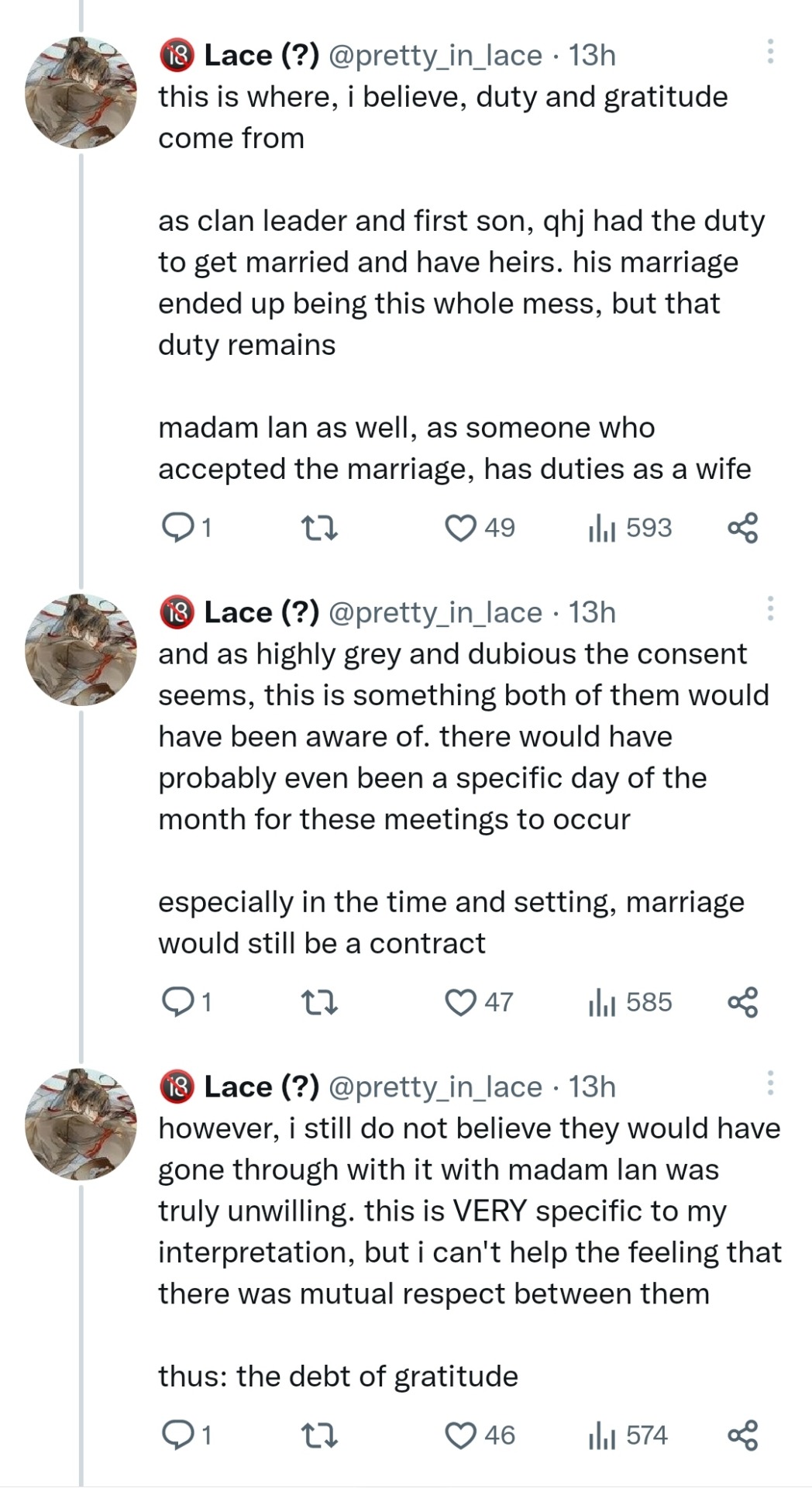
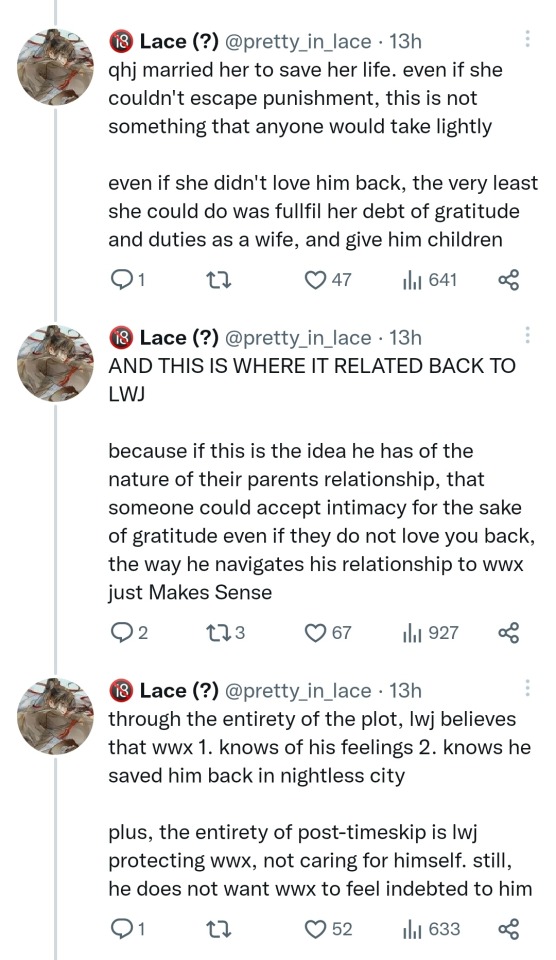
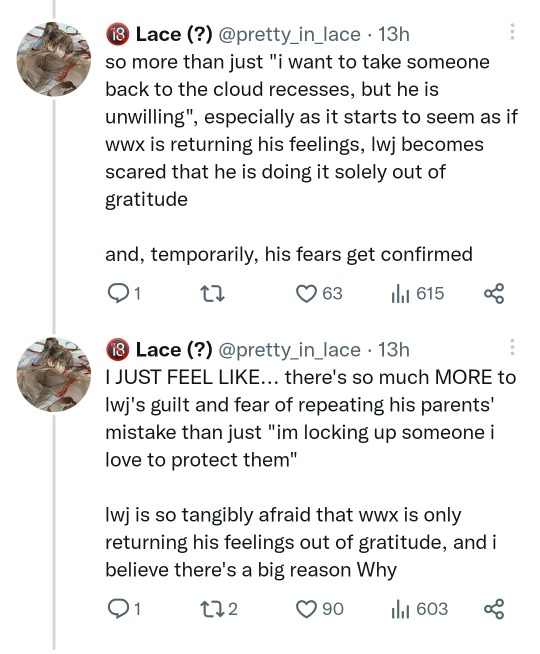
74 notes
·
View notes